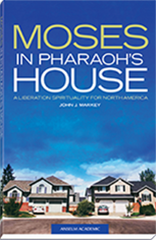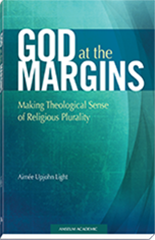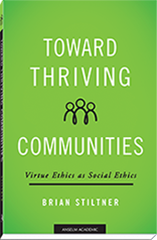Moses in Pharaoh’s House
A Liberation Spirituality for North America
About This Book
Overview
John Markey argues that North Americans are enslaved by a false sense that self-centered idealism is morally good and necessary for achieving the common good. Moses in Pharaoh’s House: A Liberation Spirituality for North America explores how those living inside the oppressive structures of the First World can be freed from false ideologies to achieve personal and sociopolitical conversion. Using the story of Moses and the Exodus, the book presents a spirituality of conversion for the privileged and develops a connection between the liberation of the oppressed and conversion of the privileged.
Details
| Weight | 0.5 lbs |
|---|---|
| Dimensions | 5.375 × 1.5 × 8.25 in |
| Format | Softcover |
| Print ISBN | 978-1-59982-326-3 |
| Pages | 208 |
| Item # | 7054 |
|---|
Customer Reviews
“How do we help free others when we are part of their problem? . . . John Markey’s Moses in Pharaoh’s House helps us see more clearly the huge elephant inside the room of liberation theology and spirituality . . . with an empathy that invites conversion rather than sprays guilt. It also suggests some practical roads to take us forward.”
“John Markey’s brilliant reflection, Moses in Pharaoh’s House, makes an enormous contribution to the existing literature on the preferential option for the poor and reminds us of the universal call to liberation. . . . Markey identifies the walls that confine the human spirit and breaks down the dualisms between ‘us’ and ‘them.’ . . . Offering a Gospel-based vision of authentic freedom and human solidarity, he helps us see that conversion is not just about individual change but also about social and communal transformation. As he reminds us that we cannot understand the mystery of our lives independently of the mystery of God, he also helps us see that we cannot understand who we are independently of our connection to one another, especially our neighbor in need.”
“[In Moses in Pharaoh’s House, John Markey] has created a work of compelling power and intellectual depth that asks people in the U.S. to experience the world in a radically different way. If Christians are to imitate Christ, then we, . . . must make choices in keeping with God’s love for those at the economic and political margins of our world. Only then do we begin the dismantling of the walls of pharaoh’s house.”
“In Moses in Pharaoh’s House, John Markey provides us a deft pathway out of Pharaoh’s house–moving toward a more authentic and engaged spirituality for North Americans that addresses both the oppressive elements of our culture and the consequences those elements have for other people around the world. Its analysis of what walls us in and keeps us from a more genuine Gospel living is incisive and insightful. A must-read for those who seek liberation from what ails us and who want to create greater global solidarity.”
Table of Contents
Chapter 1: The Example of Moses
- Moses’ Conversion
- Liberation Theology and Conversion
- Outline of This Book
Chapter 2: The First Wall of Pharaoh’s House: Individualism
- How People Become “Walled In”
- First Wall: Radical Individualism
- Conclusion
Chapter 3: The Second Wall: Envy
- The Good Another Had
- The Logic of Marketplace
- The Christian Creed and the Liberal Creed
- An American Tragedy
- The Joneses’ Problem
- Conclusion
Chapter 4: The Third Wall: Superficial Optimism
- The Problem of Evil
- Optimism versus Hope
- A Disconnected Dream
- The Popularity of Impressionism
- Beauty, Race, and Class
- Conclusion
Chapter 5: Liberation as Conversion
- On the Road: Conversion as Journey
- Conversion in the Christian Tradition
- A Theology of Conversion
- Conversion as Both Initial and Ongoing
- Five Dimensions of Personal Conversion
- The Dynamics of Personal Conversion
- Conclusion
Chapter 6: Religious Conversion in America
- The “Problem” of God in America
- The True Nature of Religious Experience: Royce contra James
- The God Americans Believe In
- False Gods in American Culture
- The God of Jesus Christ
- Conclusion
Chapter 7: Authenticating Christian Conversion: The Option for the Poor
- Christian Spirituality and Empathy
- Real Poverty vs. Spiritual Poverty
- Thanksgiving as a Foundation Myth
- The Preferential Option for the Poor is at the Heart of Christian Life
- Living in Genuine Solidarity with the Poor
- Conclusion
Chapter 8: Dismantling the Walls of Pharaoh’s House
- Strategies for Dismantling the Walls of Pharaoh’s House
- Cultivating Genuine Autonomy Through Participation in Community
- Redirecting Mimetic Desire: From Envy to Christ
- Developing an Aesthetics of Hope
- Conclusion
Chapter 9: Integral Adult Conversion and Christian Spirituality: Three Personal Stories
- Christian Spirituality as Fundamentally Communal
- Christian Spirituality as Fundamentally Communal
- Trinitarian Spirituality and Christian Conversion
- Three Personal Stories of Integral Adult Conversion and Contemporary Christian Spirituality
- Conclusion






